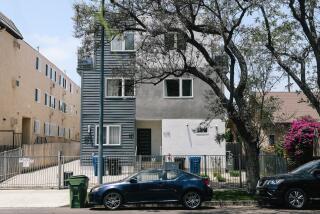RIOT AFTERMATH : Some Snapshots From the Streets
- Share via
Scenes from a riot . . .
Samy’s Camera is back in business, sort of.
Photographers come by to drop off rented equipment at a tent in the parking lot just off the corner of Beverly Boulevard and La Brea Avenue.
The roof is gone at the windowless emporium that was once the biggest photo supply house on the West Coast. The interior is a mess of twisted metal. Workers fish out fire-blackened cameras and lenses from the rubble and toss them into wooden boxes. All are unusable, ruined by fire and water.
“Looting wasn’t the main thing. They just wanted to burn us down. We were on a list, and when all this went down we were hit,” said Terry Taitz, vice president of Samy’s. Estimated loss: millions of dollars in inventory and structure damage.
Taitz wasn’t there, but neighbors say young men with automatic weapons drove up to the store in several expensive cars, including a BMW, a Lexus and a van. They smashed through a security fence with one car and shot their way in the back door. They loaded some equipment into the van, set a fire and sped off.
“The most frightening thing was how calm they were about doing this,” one neighbor said. “Like it was business as usual, like coming to collect the trash or deliver the mail.”
Another witness, who insisted on anonymity, said he was trying to fight the fire with a garden hose when the looters and arsonists returned in the BMW and Lexus.
They rolled down their windows: “Let it go,” they said. “Let it burn. Don’t put it out.”
The same crew apparently hit camera stores, music shops and electronics outlets up and down La Brea.
“It seemed to be orchestrated,” said a neighbor who witnessed the attacks on Goodman’s Music, near La Brea and 8th Street, and at United Sound and Television, near the corner of Olympic Boulevard.
“It’s like they sat down with the Yellow Pages and figured out ahead of time which places to hit. I mean, look at the stores they hit. It’s a pattern--all stores with stuff that has high resale value on the street--the audio stores, that camera store, the music store.”
Jack Godhwani stood outside the Hollywood Swap Meet, where charred beams and twisted, blackened security gates are all that remain.
Hand-scrawled signs read, “City Hall Come Here” and “50 Family Members’ Lives Were Destroyed” and “This Was My Life Up in Smoke.”
“I had a business down the block and everything’s gone,” the immigrant from India said. He pointed to the smashed glass storefront where a sign on the awning said, “Exotic Cotton Ladies’ Wear at Unbelievable Low Low Prices!”
Godhwani said he used to make a living for his family of four, selling dresses and trinkets to tourists and locals. Now, he said: “I have nothing else. I’m lost, depressed, don’t know what to do. Maybe somebody will read this and give me a loan.”
The first looters on Hollywood Boulevard were street people, merchants said. When the smoke began to rise, outsiders arrived.
Almost a week later, a sign is propped up against a traffic light at the corner of Pico and Hauser boulevards in the Mid-City District. “We Our Neighborhood, so tonite . . . we fight back. Our streets and alleys will be blocked.”
In Culver City, about 200 residents came to City Hall earlier this week with soap and towels for National Guard troops. Restaurants, business and service clubs provide the troops with two hot meals a day, movies, hot coffee, soda and snacks. The soldiers shower at the municipal plunge.
Mixed feelings on the beach:
“Economics are going to tend to squeeze out lower-income people,” said a Venice landlord whose building was ransacked. “But as a property owner, I don’t believe I’m responsible for their underlying problems. I’m trying to make a living.”
Soroya Greene, 18, an Oakwood resident and student at Santa Monica College: “I don’t condone violence, but it’s wakened a lot of people. If we were marching, we wouldn’t have gotten the coverage we have out of it.”
Another Venice resident: “When we fled, we fled to Laguna, which is the whitest place we could find. But it felt like being in Disneyland for three days. I don’t want to live like that. I like being in a racially mixed place.”
A visitor: “It’s like being in Central America,” said Sylvie Guade, a teacher from Paris, after being shooed away from Venice Beach by a National Guardsman’s gun on Saturday. Meanwhile, the Beatles’ “All You Need Is Love” boomed out of a beachfront apartment.
Johnny Grant, honorary mayor of Hollywood, opened Tuesday’s emergency meeting of the Hollywood Chamber of Commerce on a positive note: “There’s no for sale sign on the Hollywood sign!” he said.
But tempers flared when one resident accused another of closing off the streets of their mutual neighborhood at gunpoint.
“We took certain actions with the tacit approval of the police, since we noted that no actions were being taken against looters,” said the accused vigilante, a middle-aged white.
“A number of people are disturbed by these actions,” said his neighbor, who identified herself as a Latina. “They point their guns at people and say, ‘What are you doing here?’ ”
City Councilman Michael Woo tried to calm the troubled waters. “If we’re going to recover, we’re going to have to see each other as neighbors, not threats to each other.”
LAPD Capt. John Higgins reminded merchants to file their burglary reports. “We all wanted more police in Hollywood, and now we’ve got it,” he said. “We have it now, and we’re going to make the streets safer.”
The bad news: The extra police won’t be around forever, and unless the city approves overtime pay, Hollywood station will soon be decimated as officers take time instead of money for their extra work.
Vahid Sapir, owner of StarLine sightseeing tours, said business is about 5% of normal. “All the groups from Japan have canceled,” he said.
Grant said the chamber will rededicate Marylin Monroe’s star on the Hollywood Walk of Fame. “We’re going to show everybody that business is as usual on Hollywood Boulevard and the tourists will come back.”
Life is getting back to normal in Beverly Hills, but some blue-collar workers will find it hard to forget their panic when the buses stopped running well before they were supposed to at 4 p.m. Thursday, the day the riots reached the Westside. About 3:30 p.m. a group of about 30 people were waiting at a bus stop at Wilshire Boulevard and Beverly Drive. “There is no one to take us home,” one woman shouted. “How are we going to get home?”
One RTD driver stopped to explain that bus service was canceled. The crowd begged the driver to take them home, to no avail.
James Jackson, who lives in South-Central and has detailed cars in Beverly Hills for 20 years, was among those stranded. “This is what causes chaos,” he said. “What can we do? How can we get home?”
After waiting for more than an hour, four people tried to get a cab. Five more took off walking east down Wilshire.
John-Paul Smith, a Santa Monica waiter, is disappointed about the riots. It’s not the violence that bothers him: “It’s costing me the 100 bucks I would usually make tonight.”
Also contributing to this report were Bernice Hirabayashi, Petula Dvorak, Nancy Hill-Holtzman, Ken Ellingwood and Marjorie Murray.
More to Read
Sign up for Essential California
The most important California stories and recommendations in your inbox every morning.
You may occasionally receive promotional content from the Los Angeles Times.










